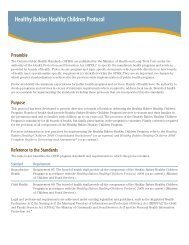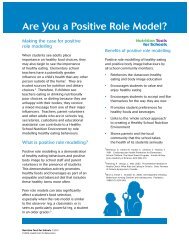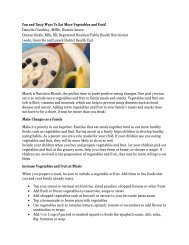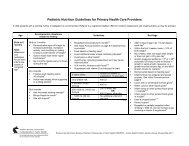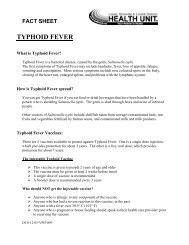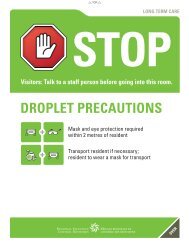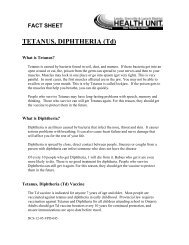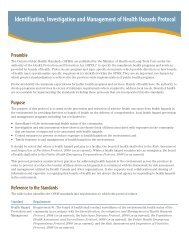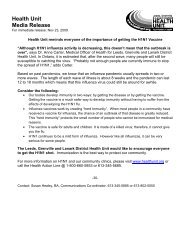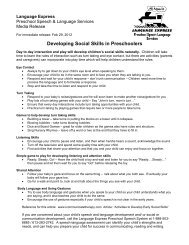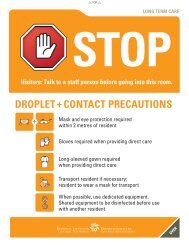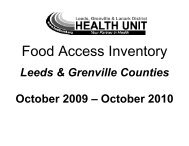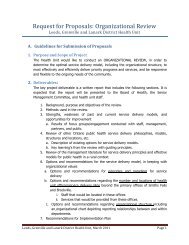Red Flags â - Leeds, Grenville and Lanark District Health Unit
Red Flags â - Leeds, Grenville and Lanark District Health Unit
Red Flags â - Leeds, Grenville and Lanark District Health Unit
You also want an ePaper? Increase the reach of your titles
YUMPU automatically turns print PDFs into web optimized ePapers that Google loves.
GROWTH & DEVELOPMENT<br />
ATTACHMENT<br />
Children’s Mental <strong>Health</strong> research shows that the quality of early parent-child relationships has an<br />
important impact on a child’s development <strong>and</strong> his ability to form secure attachments. A child who<br />
has secure attachment feels confident that he can rely on the parent to protect him in times of distress.<br />
This confidence gives the child security to explore the world <strong>and</strong> establish trusting relationships<br />
with others. As a result, current mental health practice is to screen the quality of the parent-child<br />
interactions.<br />
The following items are considered from the parent’s perspective, rather than the child’s. If a parent<br />
states that one or more of these statements describes their child, the child may be exhibiting signs of<br />
an insecure attachment; consider this a red flag:<br />
0-8 months<br />
□□ Is difficult to comfort by physical contact<br />
such as rocking or holding<br />
□□ Does things or cries just to annoy you<br />
8-18 months<br />
□□ Does not reach out to you for comfort<br />
□□ Easily allows a stranger to hold him/her<br />
18 months - 3 years<br />
□□ Is not beginning to develop some<br />
independence<br />
□□ Seems angry or ignores you after you have<br />
been apart<br />
3-4 years<br />
□□ Easily goes with a stranger<br />
□□ Is too passive or clingy with you<br />
Problem signs ...<br />
if a mother or primary caregiver is frequently<br />
displaying any of the following, consider this<br />
a red flag:<br />
►► Being insensitive to a baby’s<br />
communication cues<br />
►► Often unable to recognize baby’s cues<br />
►► Provides inconsistent patterns of<br />
responses to the baby’s cues<br />
►► Frequently ignores or rejects the baby<br />
►► Speaks about the baby in negative terms<br />
►► Often appears to be angry with the baby<br />
►► Often expresses emotions in a fearful or<br />
intense way<br />
4-5 years<br />
□□ Becomes aggressive for no reason (e.g.,<br />
with someone who is upset)<br />
□□ Is too dependent on adults for attention,<br />
encouragement <strong>and</strong> help<br />
WHERE TO GO FOR HELP<br />
See Attachment in the Where to Go for Help<br />
section at the back of this document.<br />
8 <strong>Red</strong> <strong>Flags</strong>: Early Identification in <strong>Leeds</strong>, <strong>Grenville</strong> & <strong>Lanark</strong> November 2007



